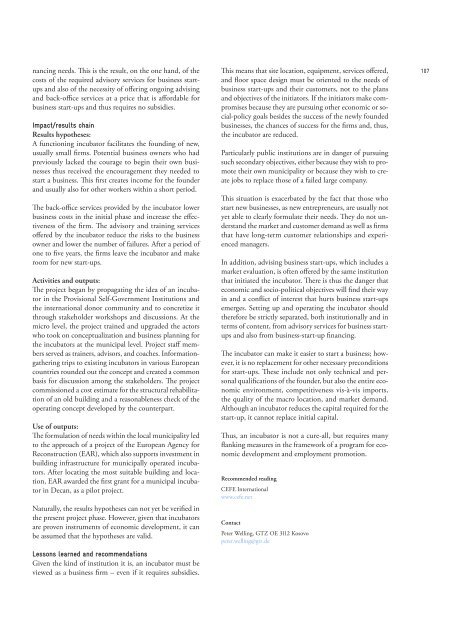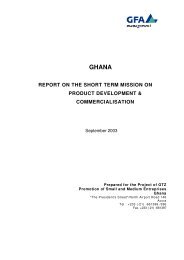Local/Regional Economic Development in South ... - Value Chains
Local/Regional Economic Development in South ... - Value Chains
Local/Regional Economic Development in South ... - Value Chains
Create successful ePaper yourself
Turn your PDF publications into a flip-book with our unique Google optimized e-Paper software.
nanc<strong>in</strong>g needs. This is the result, on the one hand, of the<br />
costs of the required advisory services for bus<strong>in</strong>ess startups<br />
and also of the necessity of offer<strong>in</strong>g ongo<strong>in</strong>g advis<strong>in</strong>g<br />
and back-office services at a price that is affordable for<br />
bus<strong>in</strong>ess start-ups and thus requires no subsidies.<br />
Impact/results cha<strong>in</strong><br />
Results hypotheses:<br />
A function<strong>in</strong>g <strong>in</strong>cubator facilitates the found<strong>in</strong>g of new,<br />
usually small firms. Potential bus<strong>in</strong>ess owners who had<br />
previously lacked the courage to beg<strong>in</strong> their own bus<strong>in</strong>esses<br />
thus received the encouragement they needed to<br />
start a bus<strong>in</strong>ess. This first creates <strong>in</strong>come for the founder<br />
and usually also for other workers with<strong>in</strong> a short period.<br />
The back-office services provided by the <strong>in</strong>cubator lower<br />
bus<strong>in</strong>ess costs <strong>in</strong> the <strong>in</strong>itial phase and <strong>in</strong>crease the effectiveness<br />
of the firm. The advisory and tra<strong>in</strong><strong>in</strong>g services<br />
offered by the <strong>in</strong>cubator reduce the risks to the bus<strong>in</strong>ess<br />
owner and lower the number of failures. After a period of<br />
one to five years, the firms leave the <strong>in</strong>cubator and make<br />
room for new start-ups.<br />
Activities and outputs:<br />
The project began by propagat<strong>in</strong>g the idea of an <strong>in</strong>cubator<br />
<strong>in</strong> the Provisional Self-Government Institutions and<br />
the <strong>in</strong>ternational donor community and to concretize it<br />
through stakeholder workshops and discussions. At the<br />
micro level, the project tra<strong>in</strong>ed and upgraded the actors<br />
who took on conceptualization and bus<strong>in</strong>ess plann<strong>in</strong>g for<br />
the <strong>in</strong>cubators at the municipal level. Project staff members<br />
served as tra<strong>in</strong>ers, advisors, and coaches. Informationgather<strong>in</strong>g<br />
trips to exist<strong>in</strong>g <strong>in</strong>cubators <strong>in</strong> various European<br />
countries rounded out the concept and created a common<br />
basis for discussion among the stakeholders. The project<br />
commissioned a cost estimate for the structural rehabilitation<br />
of an old build<strong>in</strong>g and a reasonableness check of the<br />
operat<strong>in</strong>g concept developed by the counterpart.<br />
Use of outputs:<br />
The formulation of needs with<strong>in</strong> the local municipality led<br />
to the approach of a project of the European Agency for<br />
Reconstruction (EAR), which also supports <strong>in</strong>vestment <strong>in</strong><br />
build<strong>in</strong>g <strong>in</strong>frastructure for municipally operated <strong>in</strong>cubators.<br />
After locat<strong>in</strong>g the most suitable build<strong>in</strong>g and location,<br />
EAR awarded the first grant for a municipal <strong>in</strong>cubator<br />
<strong>in</strong> Decan, as a pilot project.<br />
Naturally, the results hypotheses can not yet be verified <strong>in</strong><br />
the present project phase. However, given that <strong>in</strong>cubators<br />
are proven <strong>in</strong>struments of economic development, it can<br />
be assumed that the hypotheses are valid.<br />
Lessons learned and recommendations<br />
Given the k<strong>in</strong>d of <strong>in</strong>stitution it is, an <strong>in</strong>cubator must be<br />
viewed as a bus<strong>in</strong>ess firm – even if it requires subsidies.<br />
This means that site location, equipment, services offered,<br />
and floor space design must be oriented to the needs of<br />
bus<strong>in</strong>ess start-ups and their customers, not to the plans<br />
and objectives of the <strong>in</strong>itiators. If the <strong>in</strong>itiators make compromises<br />
because they are pursu<strong>in</strong>g other economic or social-policy<br />
goals besides the success of the newly founded<br />
bus<strong>in</strong>esses, the chances of success for the firms and, thus,<br />
the <strong>in</strong>cubator are reduced.<br />
Particularly public <strong>in</strong>stitutions are <strong>in</strong> danger of pursu<strong>in</strong>g<br />
such secondary objectives, either because they wish to promote<br />
their own municipality or because they wish to create<br />
jobs to replace those of a failed large company.<br />
This situation is exacerbated by the fact that those who<br />
start new bus<strong>in</strong>esses, as new entrepreneurs, are usually not<br />
yet able to clearly formulate their needs. They do not understand<br />
the market and customer demand as well as firms<br />
that have long-term customer relationships and experienced<br />
managers.<br />
In addition, advis<strong>in</strong>g bus<strong>in</strong>ess start-ups, which <strong>in</strong>cludes a<br />
market evaluation, is often offered by the same <strong>in</strong>stitution<br />
that <strong>in</strong>itiated the <strong>in</strong>cubator. There is thus the danger that<br />
economic and socio-political objectives will f<strong>in</strong>d their way<br />
<strong>in</strong> and a conflict of <strong>in</strong>terest that hurts bus<strong>in</strong>ess start-ups<br />
emerges. Sett<strong>in</strong>g up and operat<strong>in</strong>g the <strong>in</strong>cubator should<br />
therefore be strictly separated, both <strong>in</strong>stitutionally and <strong>in</strong><br />
terms of content, from advisory services for bus<strong>in</strong>ess startups<br />
and also from bus<strong>in</strong>ess-start-up f<strong>in</strong>anc<strong>in</strong>g.<br />
The <strong>in</strong>cubator can make it easier to start a bus<strong>in</strong>ess; however,<br />
it is no replacement for other necessary preconditions<br />
for start-ups. These <strong>in</strong>clude not only technical and personal<br />
qualifications of the founder, but also the entire economic<br />
environment, competitiveness vis-à-vis imports,<br />
the quality of the macro location, and market demand.<br />
Although an <strong>in</strong>cubator reduces the capital required for the<br />
start-up, it cannot replace <strong>in</strong>itial capital.<br />
Thus, an <strong>in</strong>cubator is not a cure-all, but requires many<br />
flank<strong>in</strong>g measures <strong>in</strong> the framework of a program for economic<br />
development and employment promotion.<br />
Recommended read<strong>in</strong>g<br />
CEFE International<br />
www.cefe.net<br />
Contact<br />
Peter Well<strong>in</strong>g, GTZ OE 3112 Kosovo<br />
peter.well<strong>in</strong>g@gtz.de<br />
107



